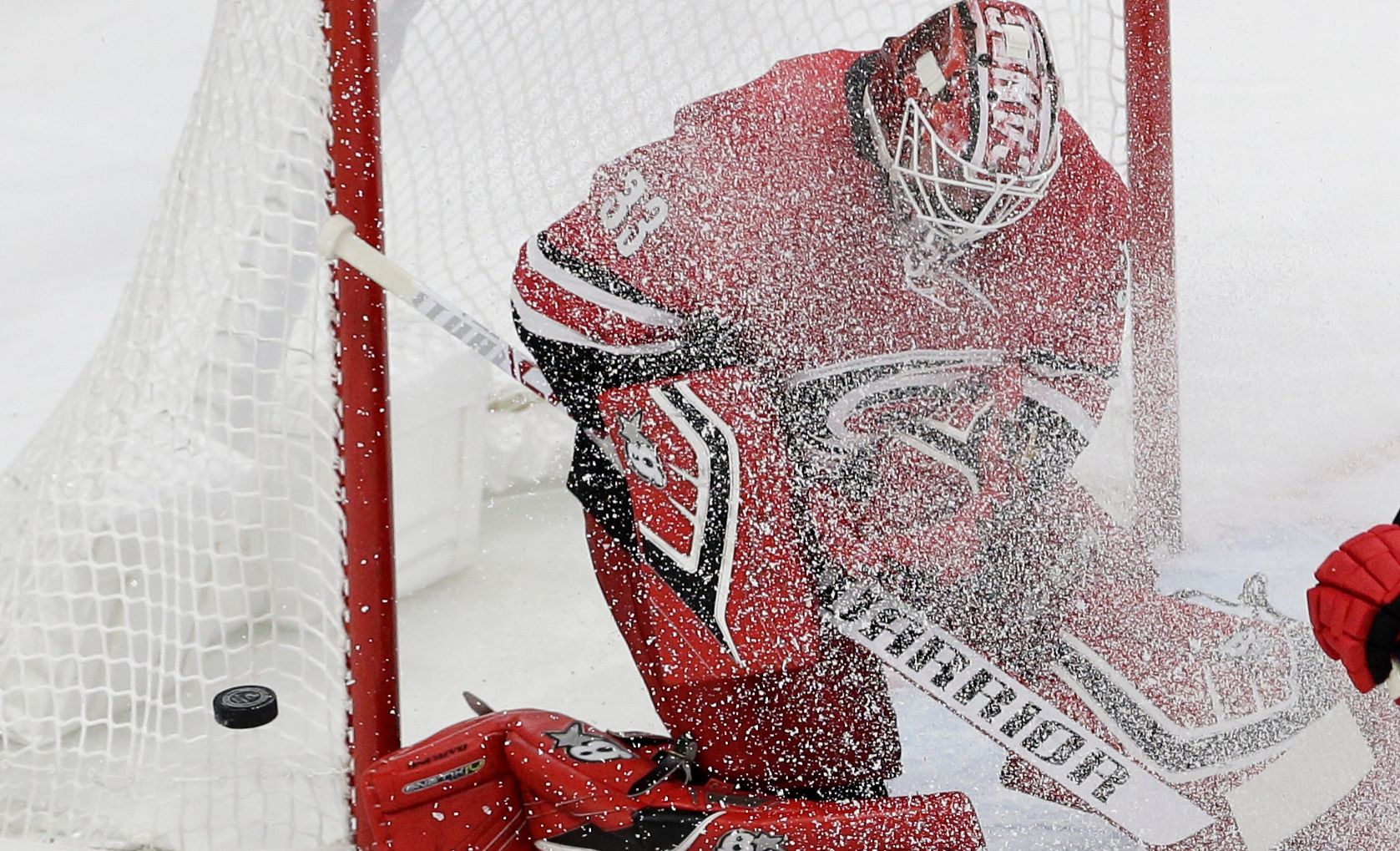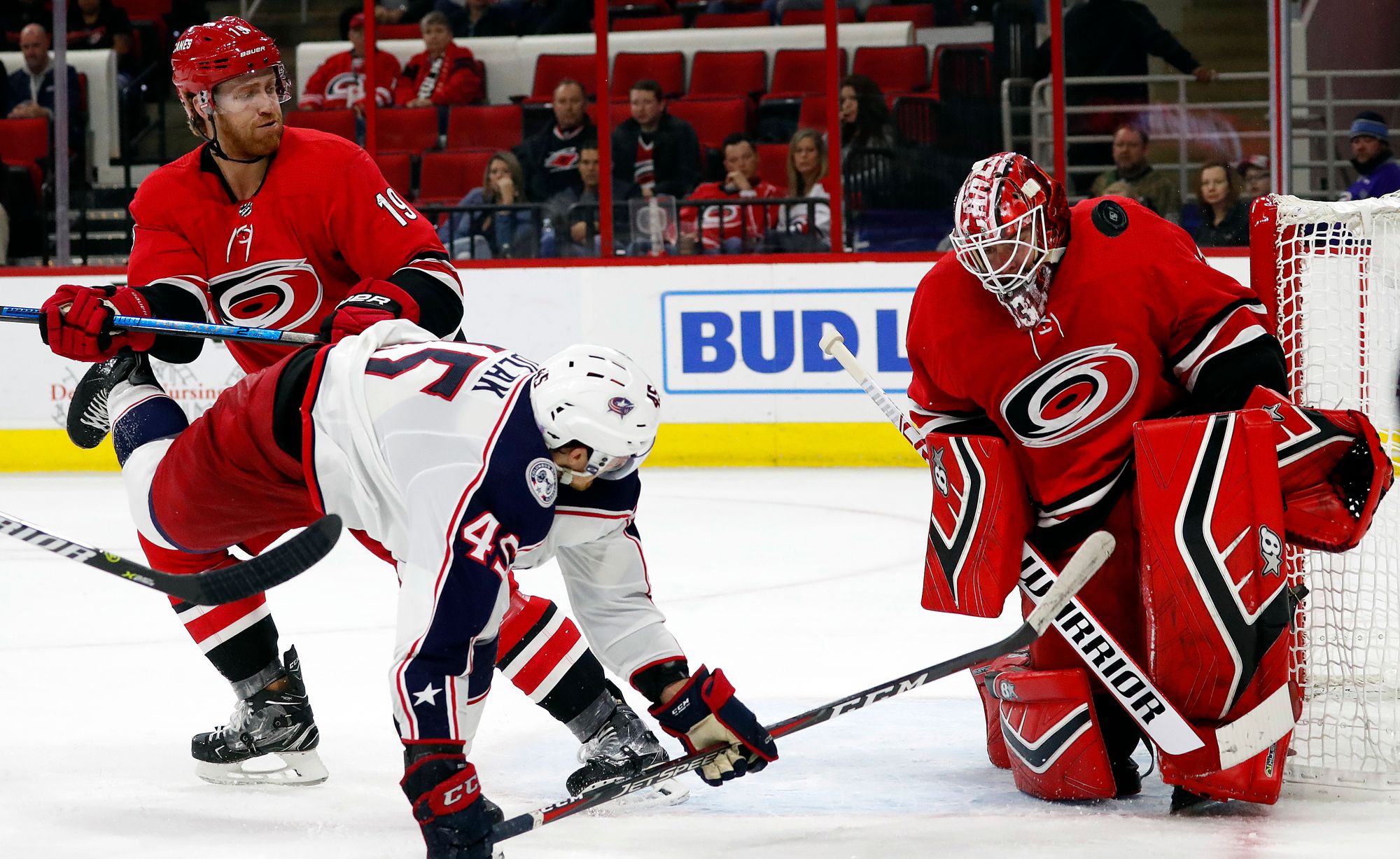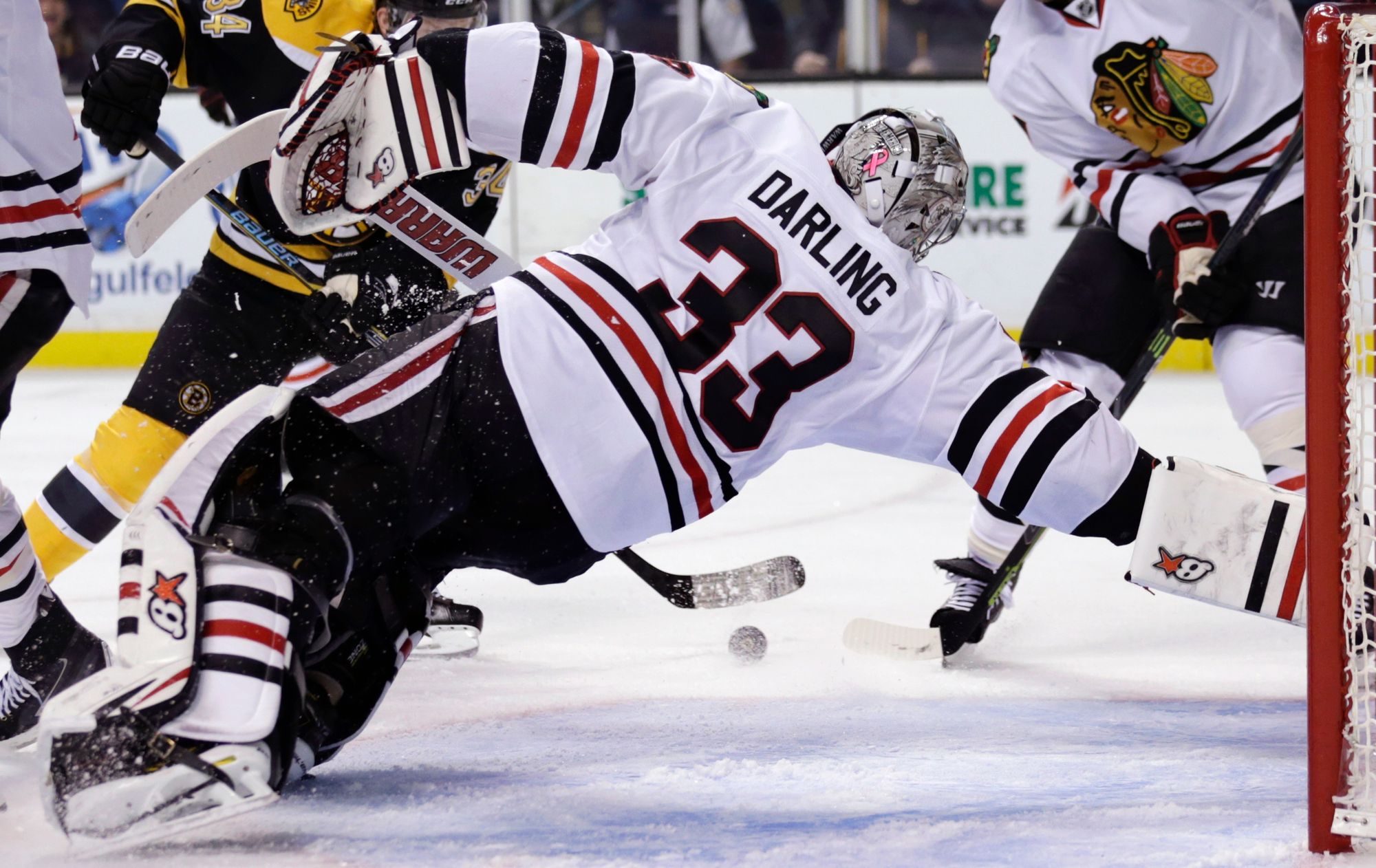Scott Darling does not throw up before he goes on stage to tell jokes.
Sure, he has mild panic attacks. Sure, he berates himself in a running dialogue marked by pure self-loathing. I hate this, he’ll tell his girlfriend. Why the hell am I doing this?
But Darling does not feel the need to purge before a stand-up comedy set the way he used to throw up before pretty much every hockey game he played in the NHL. And when he tells me this story, I tell him that Bill Russell, one of the best players in basketball history, used to throw up before nearly every game, as well.
“The great ones,” he says. “And the backup goalies.”
This is a Scott Darling punchline: Dry. Self-deprecating. It’s the kind of material he’s specialized in since taking up stand-up comedy on a whim about a year and a half ago. When he did a show in Milwaukee, he got up on stage and insulted the Green Bay Packers, which, in Wisconsin, is the comic equivalent of roasting the Pope. He attacks pretty much anything and anyone with the same dark sensibility – most notably himself and his hardships. He jokes about divorce. About death. He jokes about wishing another round of cancer on his mom for giving birth to him in Germany instead of the United States, thereby depriving him of a chance to play hockey in the Olympics.
He tells that same joke even when his mom is right there in the audience to watch him, because he understands that the best humor is so often rooted in pain. And Darling, like so many of us, has spent his life trying to balance the two.
“Everyone will be like, ‘Did he just say that?’” Darling says, speaking to me via video call from his home in Chicago. “And I’m like, ‘My mom laughs harder than anyone in the room when I tell that joke, guys, so loosen up.’”
It took a long time for Darling to learn how to loosen up. When he was a kid playing hockey in suburban Chicago and elsewhere, he was often the youngest person in the locker room by several years, so he kept his mouth shut. When he finally made the NHL after struggling through alcohol issues that nearly derailed his career, he mostly still kept quiet. “I was always afraid of getting into trouble,” he says.

Darling’s father was in the military, and he’d moved all over and lived in dozens of cities, which only continued once he started playing hockey. He was always funny, but his humor was a defense mechanism for a lonely kid who often didn’t feel like he belonged.
But when Darling turned 30, he’d been demoted to the minor leagues after three seasons with his hometown Chicago Blackhawks – where he won a Stanley Cup in 2015 – and two with the Carolina Hurricanes. He realized his hockey career was nearing his end. And he had an epiphany.
“I was just like, ‘You know what? I don’t care what people think about me,’” says Darling, now 34. “I’m proud of my career. I’m proud of what I’ve done with my life. It happened overnight when I had my 30th birthday. I went and got a hand tattoo. I was pretty much an anxious wreck my whole life, but not anymore, which is nice.”
Darling retired in 2021, and soon after, one night changed his life. He took a date to the Laugh Factory in Chicago, and while heading to the bathroom, he crossed paths with a local comedian named Ray Wisbrock. Darling tends to stand out in a crowd of locals: There aren’t many other Stanley Cup-winning former Blackhawk goaltenders who are also native Chicagoans, and who stand 6-foot-6, and who have tattoos and prodigious beards.
As Darling and Wisbrock got to talking about hockey and stand-up comedy, Wisbrock made a suggestion.
“He was like, ‘Why don’t you try it?’” Darling says. “‘Just try it one time.’”





After a suggestion from a well-known Chicago comedian, Scott Darling put down the pads and picked up a microphone to give comedy a try and has never looked back. [AP, Courtesy photos]
Darling didn’t really have that thing to replace the sport he’d been playing since he was a kid; he didn’t have something to be passionate about. He didn’t imagine that thing would be stand-up comedy, but he figured, Why the hell not? So he and Wisbrock drove to Indiana, and Darling did an eight-minute set almost completely off the top of his head. He was so nervous he doesn’t remember much of what he talked about. All he remembers is that he loved it and wanted to keep doing it.
Doing stand-up kind of led to the same feelings Darling had when he was playing hockey. The nervous energy. The rush of adrenaline. The sense that, every night he went out there, he felt like an imposter. And then he actually got out there and felt like he could do it, and do it well.
Darling started performing at one open mic night after another. At one point, another aspiring comedian told him point-blank that he wasn’t funny.
“Dude,” he told the guy. “I’ve been doing this for a month.”
“Still,” the guy replied. “You should probably quit.”
That only made Darling want to keep going, the way he’d persevered in hockey for years before getting to the NHL. And then, maybe four months into those open mic nights, he talked to another NHL player at a wedding, Luke Gazdic, who told Darling that he was doing a charity event with prominent Canadian comedian Ian Bagg (who also happens to be a huge hockey fan). Bagg invited Darling to open for him. Now he’s become a semi-regular opener for Bagg on the road.
And the woman he went on a date with that night at the Laugh Factory? She’s now Darling’s girlfriend.
“And that guy who told me I should quit,” Darling says, “is still doing open mics.”
This is not to say that Darling sees himself as a finished product on stage. Not by any means. When he first got up there, he had no idea how to craft a joke; he was just talking, with no sense of how to structure his material. But over time, he’s learning the finesse and art of comedy, the way he once learned the art of keeping pucks from trickling into nets.

Darling still performs locally before small crowds to work on his material–it’s much easier locally, he says, because he mentions he played for the Blackhawks and “it’s like a cheat code.” He takes classes at the Second City, the legendary improv theater that’s produced pretty much every Chicago comedian you’ve ever heard of. He studies the specificity and precision and timing and delivery and wording. For instance, he tells a joke about his Great Dane named Gary biting half his ear off (“It got stitched back on, I’m fine,” he deadpans). In class, he realized he could switch a couple of simple clauses in the telling and up the impact–somehow, in the process of writing the joke, Gary became a Mormon from Utah, which oddly worked better than saying Gary was from Utah and a Mormon.
Of course, like any fledgling comedian, Darling’s sets don’t always go that well. He bombs. He flails. But then, he did that in hockey sometimes, too. When he opened for Bagg in Raleigh, he set the tone by showing a video of himself in a Hurricanes uniform giving up a goal. And in a way, he says, getting through failure on the ice and on stage requires the same skill set.
“If you crumble, your game’s over,” he says. “If you’re mentally weak, goaltending is not for you, and the comedy game’s not for you. If I had a bad game, all I wanted to do was get back into the net and play again. And if I have a bad show, all I want to do is get back on stage.”
Darling strives for authenticity in his comedy. He doesn’t play a character. He leans straight into the tragedy and pain he’s endured, from his mother’s multiple bouts with cancer to his father’s accidental drowning death in 2019. Around the time he started doing comedy, he says, his longtime therapist passed away. Maybe it wasn’t entirely a coincidence.

“I think early on it was kind of therapeutic, but now it’s more routine,” he says. “But I do think it’s therapeutic to have something that I really enjoy doing. Something that makes me feel fulfilled. I consider it like a job, even though it’s not really a job.”
When his former teammates hear about his new job, they can hardly believe it. That introverted guy is up there on stage, bearing his soul? How’s that even possible? But for Darling, it feels like the journey’s just begun.
“There’s other stuff that I’ve considered joking about, but I don’t know if I’m ready yet,” Darling says. “I’m sure we’ll get to that point. There’s plenty to unpack with me, so we’ll see.”